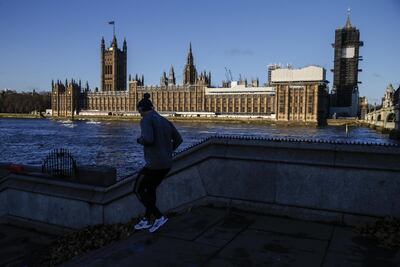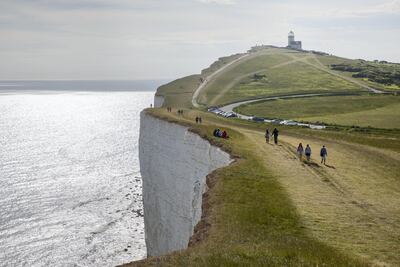The United Kingdom's departure from the European Union is like a boat setting out to sea.
First, the rope is slung off the mooring. Next, the vessel manoeuvres through the harbour, its progress delayed by engine failure, a mutinous crew, and other boats getting in the way. The sky darkens. Is sailing still wise? The captain says yes – and after a final tack, the boat rounds the breakwater, leaving safety behind and confronting the open ocean.
Why use a nautical metaphor for Brexit? Because the UK is an island, and sometimes geography can help explain politics.
The UK has always thought itself to be apart from Europe, despite its formal union over the past fifty years and its shared history for the last thousand. Its sense of difference – of solipsism, even – is wittily expressed in an apocryphal old newspaper headline: “Fog in Channel: Continent cut off.”
But why does the UK feel separate?
The limitations of any island are set by the sea, but the sea also presents possibilities. It washes through national mythology and, more prosaically, defines its economy. Britain is a trading nation, in which mercantile interests have often subordinated manufacturing. The French thinker Alexis de Tocqueville linked the sea to economic liberalism. After all, island nations have an interest in free exchange and open markets. (Abu Dhabi, the island emirate, has long been a trading hub too, with a character molded as much by saltwater as by sand). It is logical that free trade theory was first developed in Britain. Risk is the raison d’etre of the City of London.

The sea has also bred a peculiarly liberal political tradition in Britain. For much of history, Britain has had a bigger navy than army. Water, not land, underwrote its security. Britain hasn’t been ransacked by a foreign force since the Norman conquest of 1066. Britain’s kings and queens have rarely kept large standing armies capable of imposing absolute domestic control. A state with these characteristics is usually likely to be less centralised and more plural than one whose troops menace its streets.
Economic and political liberalism are not uniquely British. But they are entrenched sensibilities, and they derive at least in part from the curious psychology of living on a small rock in a big ocean.
That same psychology translates into an intellectual tradition predicated on doubt. Unlike much of the earth’s landmass, the sea is contingent, fickle, unknowable. If you depend on the sea then, to a certain extent, you forfeit power and comprehension. The people on its shores must take the world with a pinch of salt.
Consider the "empiricism" of David Hume, Britain’s most luminous philosopher. Hume argued that we know for certain only that which we can – ourselves – see, hear or touch. Until the sun rises tomorrow, I cannot be sure that it will. If someone claims something that you cannot experience yourself, then you shouldn’t necessarily believe them.
The general effect of this skeptical thinking is to weaken the basis for absolute authority. If nothing can be known for sure, and if knowledge is ultimately a matter of common sense or guesswork, then anyone asserting an absolutist vision – whether of destiny, revolution, or progress – is suspect.

For example, the French Revolution provoked revulsion in Britain. Edmund Burke, the Anglo-Irish polemicist and arch-critic of the revolution, wrote that the destruction of the "ancien regime" by fire and sword was dangerous not just because of its output in blood, but because it reflected an unjustified faith in universal principles.
Burke’s view - that it is better to trust the independent thought of ordinary people than the fever-dreams of visionaries - was influential. Subsequent British thinkers, from John Stuart Mill to Isaiah Berlin, and from George Orwell to JG Ballard, have preached the perils of totalitarianism. Britain arguably has a heightened immunity to ideology and demagogues.
So how might this explain Brexit?
The European Union was conceived to establish permanent peace in Europe. It has a providential narrative and reflects a spirit of planning and design – of grand, lasting solutions – which on some level challenges Britain’s more piecemeal approach to social organisation. And it has been driven, among others, by France and Germany.
Unlike Britain's sceptics and empiricists, the greatest French and German thinkers believe that reason can illuminate timeless truths. The 'rationalism' of Descartes holds that logic alone can supply a full understanding of the universe. Germany's most outstanding figures – Gottfried Wilhelm Leibniz, Immanuel Kant, Georg Wilhelm Friedrich Hegel, Karl Marx, Friedrich Nietzsche – also, in different ways, sought perfect certainty: in metaphysics, history, law or morality. These thinkers offered systematic accounts of who man really is, deep down, and what he must do to become himself.

To some in Britain, the EU resembles this sort of enterprise – and that is what makes it so troubling. The EU’s pursuit of harmony is its original sin. On this analysis, Britain has a freewheeling personality, while the EU yearns after order. Britain cherishes open markets and minimal government, while the EU erects "dirigiste" institutions. Britain views man as fallible, the EU sees him as perfectible.
This perceived dichotomy is, of course, false.
First, for all its regulations, the chief purpose and effect of the EU is to enable trade. The EU is the world’s biggest single market and its precepts of free movement in people, goods and services are cosmopolitan by any standard.
Second, if the EU is supposed to represent a steady march towards utopia, then it is doing badly. Most steps towards greater integration are resisted or even reversed, and many members (including the UK) benefit from significant opt-outs. EU rules sometimes seem to be honoured more in the breach than in the observance.
Finally, Britain is not as much of a breezy outlier as it thinks. Other European states (notably the Netherlands and Denmark) have similar liberal traditions, while Britain’s own commitment to the doctrine of laissez-faire has never been entirely pure. Moreover, the discourse behind Brexit has sometimes displayed the very dogmatism which its votaries purport to oppose. The "us vs them" narrative is flawed.
But it is nonetheless unsurprising that the first country to decisively reject the EU is the UK, the rain-swept island off its north-west coast. Britain’s sense of difference, inspired by its specific place in the world, has led, eventually, to its departure from the European harbour.
The country must now embrace the future alone, charting its own course on the open ocean. How well it does remains to be seen. But one thing is clear: to succeed, Britain will need to catch a fair wind and reach deep into its seafaring soul.
Sam Williams is a writer and consultant in Abu Dhabi

